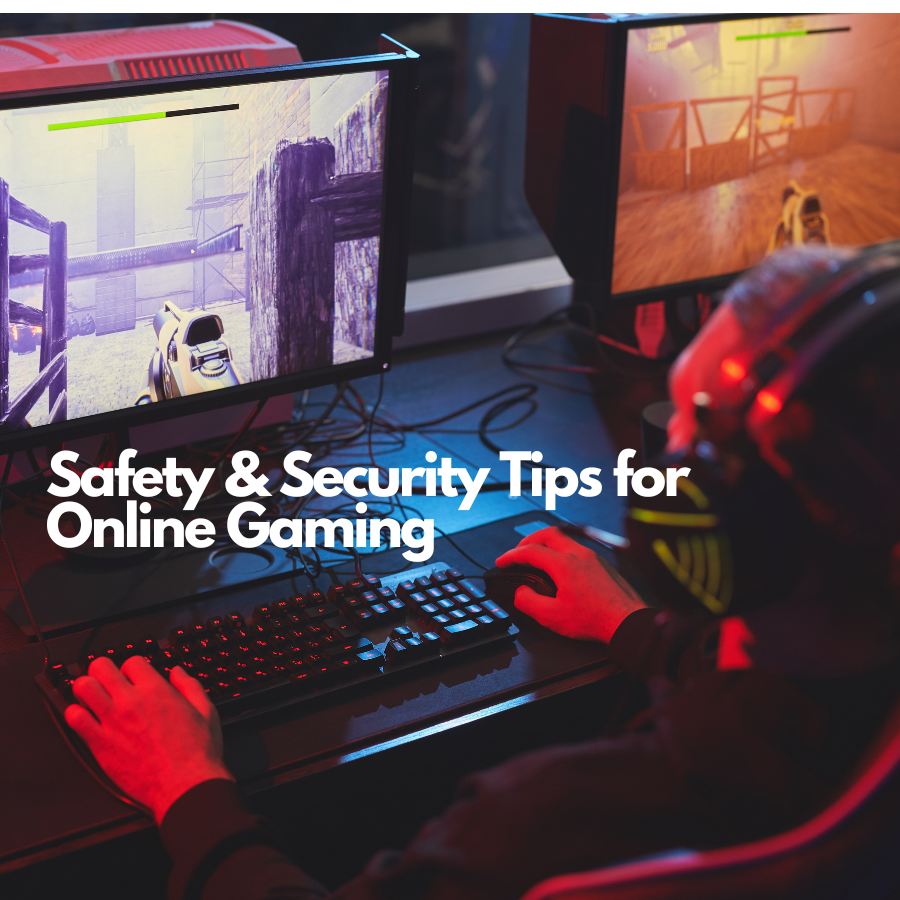Table of Contents
Online games and video games are always great fun. Playing online games has multiple advantages for kids such as increasing problem-solving skills, multi-tasking ability, nurturing memory power, and cognitive ability of children. It is a great way to connect and interact with other players online.
But, at the same time, cybersecurity for gamers has become a great concern and there are various internet gaming security concerns like viruses, identity theft, and phishing attacks. To play online games safely, online gamers need to follow a few cyber hygiene protocols. Different safe online gaming practices include keeping strong passwords, using a VPN, and frequently updating your software.
Security Issues in Online Gaming
A few cyber risks associated with online gaming are as follows –
Malware and viruses – When an online gamer uses free versions or cheaper versions of their favourite games, there exists an involuntary risk of downloading viruses and malware. The same can happen when you access the cheat codes or buy items via third-party sellers. There is also risk when you download the game legally and there is a security gap. Once malware enters your machine, hackers can easily steal your personal information.
Identity Theft – Cybercriminals hack personally identifiable information just to create profiles on their budding victims. The riskiest threat of online gaming is the chat function with strangers that allows players to talk with other players. The most sensitive information is gathered through the chat function only like name, phone number, house address, etc. Thus, online gamers need to be very careful while sharing their sensitive information through chat functions as protecting personal information in gaming is a great concern.
Account Hacks – When online gamers use the same username and passwords on all gaming platforms, there are potential risks that hackers may get hold of your credentials to gain unauthorized access to all your gaming accounts. Few hackers may use brute force attacks that involve automated scripts that include automated scripts using credentials that have been stolen from your other accounts.
Swiping and doxing – When hackers successfully get hold of your credentials or personal details, they may commit ‘doxing’, which means publishing your home address or phone number online. The main motive of doxing is to penalize, threaten, or embarrass the targeted person. There can be numerous reasons for doxing anyone like harassment, revenge, jealousy, or even profits. Doxing is something that has the potential to ruin anyone’s life entirely.
Spyware – Gamers can be targeted by spyware schemes, especially when they are playing with distrustful online gaming sites. Spyware tracks the gamer’s online motion without his knowledge. When the online activity of any person is recorded by spyware, it can be even sold to third parties which can end up in a breach of privacy.
Data Breaches – Potential hackers can even steal important data from publishers directly. Anything can be stolen, right from the source code, games, and the personal information that is stored in the user’s accounts. Data breaches are one of the major cyber security concerns of online gaming.
Cross-Site Scripting – Conventional gaming platforms might be using doubtful methods to process your login information. It makes your credentials more vulnerable to potential hackers for cross-site scripting that allows criminals to interrupt and steal those confidential details.
DDoS Attacks – Distributed Denial of Service attacks happen when cybercriminals make efforts to overload gaming servers which can end up in a bang that makes service offline. This crime does not involve stealing data but still interrupts users. The downtime and recovery time can prove expensive for gaming providers.
Phishing emails – Phishing emails or phishing links that are distributed via chat during online gaming are yet another way used by hackers to cheat online gamers, letting them download game malware into their devices. For instance, the emails or chats may look like they are coming from credible sources, asking you to download bonus content or access a login page. But, in actuality, the emails are fake and have nasty intent.
Cyberbullying – A few times, online gamers may face abuse from other players. Cyberbullies may attempt to humiliate their victims and also force them to disclose their personal information that can be used against them.
Tips for Safe & Secure Online Gaming
There are potential risks for online gaming that can only be minimized by following certain Multiplayer game safety measures. Here are important gaming privacy tips that can allow you to play your favourite online games safely-
Choose a gaming website with an SSL Certificate installed – Playing online games at a gaming website, is well protected by a trusted SSL/TLS certificate helps to prevent various cyber threats. It encrypts the connection between a website’s server and a user’s browser ensuring secure data transmission. You can safely trust a gaming website installed SSL and play online games without any hesitation. This way, you can ensure that the site you wish to play games online is safe and secure.
Employ Strong Passwords on Your Online Gaming Accounts – You should have strong and unique passwords with at least 16 characters for each of your online gaming accounts to prevent numerous cyber threats such as brute force attacks, credential stuffing, and other password attacks. It may be difficult to remember all your unique passwords, thus you may use a password manager to remember them on your behalf to secure gaming accounts.
Permit Multi-Factor Authentication (MFA) – MFA needs an additional method of authentication. In this method, a code is sent to an authenticator app that an attacker can access to your account merely using your credentials. The most prevalent online gaming authentication methods offer chic MFA options for avoiding online gaming scams. A good password manager can easily manage the MFA codes for you.
Making Use of Virtual Private Network (VPN) During Online Gaming – Online gamers use a VPN sometimes that encrypts the internet traffic coming towards your gaming site. Usually, gamers avoid using VPNs as it slows down their gameplay. However, a high-quality VPN that uses modern security protocols doesn’t affect your internet speed. Nowadays, even VPNs are created keeping online gamers in mind. VPN is best to secure gaming networks for online gamers as it hides your traffic and location. Thus, it prevents doxxing and swatting in turn.
Pick an Anonymous Username – PII involves date of birth, age, names and others. It seems that username is harmless information, still, cybercriminals can use any information to commit cyber crimes at any time. It is recommended to pick an anonymous username for online gamers that is different from the real name and can’t be connected to a digital footprint.
Frequently Update Your Gaming Software – Software updates bear security patches that hit the known susceptibilities. Cybercriminals usually target users, soon after the security patch is released just to exploit the vulnerability before updating and fixing it. It is recommended to download software updates from time to time.
Recognize Common Scams – Numerous phishing, spoofing, and malware attacks are too common in the online gaming world. You can keep on updating yourself regarding common prevalent cyber attacks by keeping an eye on credible gaming news sites and also the company behind your online games.
Use Credit Card to Make Purchases – Credit cards are a safer option for making purchases and preventing fraudulent charges as compared to debit cards.
Download and Play Online Games Using Credible Sites- Avoid using free or discounted pirate websites or other unauthorized sources to download your online games. These options can make you more vulnerable to malware and other sorts of cyber attacks. It is highly recommended to use only official websites to download your favourite games. Prevent downloading any suspicious game files as it can put your computer and all your data at cyber risk.
Conclusion
Online games are more vulnerable to cyber-attacks and thus it is crucial to take extra precautions while playing online video games. You can use various cyber protocols while online gaming such as creating unique and strong passwords for your gaming accounts, using credible gaming sites, and employing a VPN to prevent various cyber threats.









